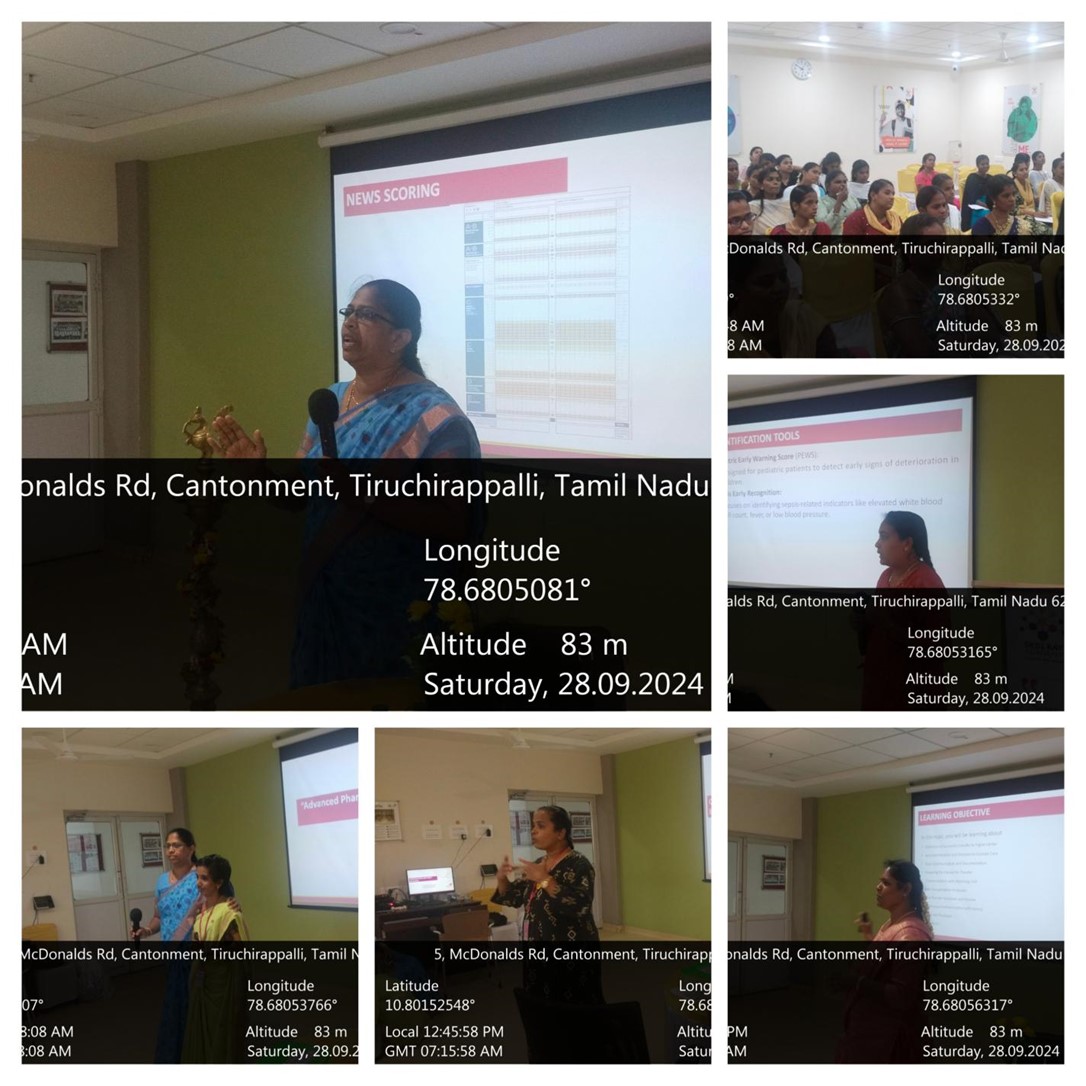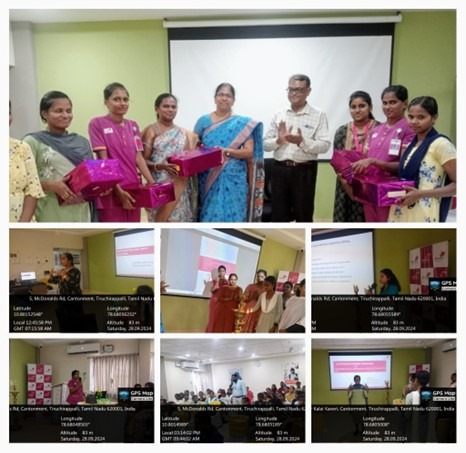In-house Continuing Nursing Education (CNE) on “Rapid Response Mastery: Effective Management of clinical deterioration in inpatient care” at Kauvery Hospital, Cantonment
Cecily Ruba1, Mahalakshmi2
1Nurse Educator Kauvery Hospital, Cantonment, Trichy
2Nursing Superintendent, Kauvery Hospital, Cantonment, Trichy
Background
The Continuing Nursing Education (CNE) Program, “Rapid response Mastery Effective management of clinical deterioration in in patient care “was conducted on September 28 2024. This significant educational initiative was spearheaded by our visionary esteemed Nursing Superintendent Mrs. Mahalakshmi in collaboration with Cecily Ruba, Nurse Educator Cantonment, and our respected medical administrator who motivated us to conduct in KCN. The total members who attended the event was 50 and that includes:
- Organizing Chairperson – 1
- Organizing Secretary – 1
- Doctors – 2
- Pharmacist – 1
- Speakers – 12
- Delegates – 36 (Tennur -5, Maa Kauvery-5, Heartcity-5, Cantonment-21).
Objective
The Primary objective of this CNE Program was to equip ward nurses with the essential skills and knowledge necessary to recognize and manage clinical deterioration effectively, ensuring timely interventions and optimal patient outcomes.
Another objective was Effective communication with health care teams to escalate care, and to understand protocols for transferring patients to higher levels of care such as ICU, HDU whenever necessary.
This program addressed’ the growing need for enhanced nursing competencies in managing clinical deterioration aligning with our health care organization’s commitment to delivering high quality patient care.
Program Overview
The CNE program covered a total of 12 topics delivered by esteemed speakers
Pre Test: Ms. Uma, Nursing in-charge initiated the program with a pretest that utilized QR codes, an efficient assessment method.
Session 1: Navigating Clinical Decline – A ward-based approach by Cecily Ruba, Nurse Educator, Cantonment
She emphasized the importance of early identification and proactive care in managing clinical decline that includes
- Monitoring vital signs and clinical indicators
- Recognizing early warning signs
- Implementing evidence based practice
- Collaborating with health care teams for timely escalation of care
- Documenting patient progress and adjusting care plans accordingly.
This approach enables nurses to identify and manage decline promptly, preventing unnecessary complications and improving patient outcomes.
Session 2: Proactive Care – Early Identification of clinical deterioration by Ms. Deepa, Nursing Supervisor, ICU
She highlighted the following
- Proactive care is crucial in identifying clinical deterioration strategies for early identification.
- Assessing clinical indicators
- Recognizing subtle changes in inpatient behavior.
- Utilizing Early warning score
- Utilizing Telemetry system to watch or monitor patient decline.
Nurses play a vital role in proactive care by staying vigilant, acting swiftly and prioritizing patient safety.
Session 3: Strategic Evaluation – Systematic Assessment in Clinical Settings by Ms Subathra, Nursing Supervisor
She emphasized,
- Conducting comprehensive assessments
- Utilizing Standardized assessment tools e.g. (ABCDE approach)
- Evaluating laboratory results and diagnostic findings
- Integrating information from multiple sources (e.g. Patient, Family health care team)
- Documenting findings and adjusting care plans.
This strategic evaluation enables nurses to identify underlying causes of deterioration and develop targeted interventions.
Session 4: Advanced Pharmacological Approaches – Enhancing Treatment Efficacy by Ms. Surya Prabha
She explored,
- Evidence based medication management personalized medication plans
- Monitoring for adverse effects and interactions
- Adjusting medications regimens based on patient response
- Collaborating with pharmacists and health care teams
Advanced pharmacological approaches enhance treatment efficacy, reduce complications and improve patient outcomes
Session 5: Elevating care through communication and timely evaluation – conducted by Ms. Esther Nursing Supervisor.
- Clear concise communication among healthcare teams
- Timely notifications of changes in inpatient condition. Collaborative decision making
- Documenting communication and care decisions
- Prioritizing patient centered care
Elevating care through communication ensures seamless transitions and optimal patient outcomes.
Session 6: Guiding the way: Protocols for successful transfers to higher care by Ms.Jenma Nursing supervisor
She outlined about,
- Transferring patients to higher levels of care requires precision
- Identifying criteria for transfer
- Preparing patients and families for transfer and coordinating with receiving teams.
- Consents
- Ensuring continuity of care
- Documenting transfer decisions and plans
Protocols for successful transfers ensure smooth transitions and optimal patient outcomes.
Session 7: From Assessment to intervention – Managing common acute conditions by Dr. Ramya, Intensivist, Kauvery Hospital
Dr. Ramya provided expertise on
- Managing acute conditions requires swift assessment and intervention by Recognizing common acute conditions e.g. Sepsis Cardiac arrest
- Conducting rapid assessments implementing evidence based interventions
- Collaborating with health care teams monitoring patient response and adjusting care plans.
Effective management of acute conditions prevents complications and improves patient outcomes.
Session 8: An Assessment – conducted by Dr. Amala Deepan, Intensivist Kauvery Hospital
He included ABCDE initial approach, to approach every patient in systematic way. Furthermore, he elaborated about anaphylaxis, certain severe acute conditions like severe asthma, tachyarrhythmia. Assessment and detecting acute conditions will always enrich knowledge of all the ward nurses.
Session 9: Proactive health approaches – Post-deterioration care by Ms. Mohana Priya Senior nurse
Post deterioration care involves proactive strategies Ms. Mohana Priya discussed,
- Preventing future deterioration
- Optimizing patient recovery
- Enhancing patient education and engagement
- Facilitating smooth transitions to continuity care
Proactive health approaches ensure patients receive comprehensive care reducing readmissions and improving long term outcomes.
Session 10: Skill station with Hands on training in assessing and managing Common Acute conditions using Early warning score (NEWS) – conducted by Ms. Nirmala, Nursing Supervisor, Ms.Priya Nursing incharge.
Scenario was created patient was assessed according to decline based on NEWS score treated accordingly. This includes Calculating NEWS score and assessing patient. At the end of the programme certificates were given to all the delegates. Resource persons were honored by memento by our medical administrator.
Conclusion
The Rapid Response Mastery “CNE program successfully equipped participants with the knowledge and skills necessary to manage clinical deterioration effectively by emphasizing early detection systematic assessment and evidence based interventions this program aimed to prevent adverse outcomes and ensure timely care escalation. The interactive scenario based practice and expert presentations made this program a valuable resource for ward nurses.
Photo Gallery



